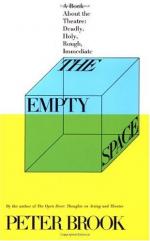
|
| Name: _________________________ | Period: ___________________ |
This test consists of 5 multiple choice questions, 5 short answer questions, and 10 short essay questions.
Multiple Choice Questions
1. "The moment of performance, when it comes, is reached through two passageways--the foyer and the..." what?
(a) Stage door.
(b) Balcony.
(c) Exit.
(d) Orchestra pit.
2. What director/playwright was rooted in the cabaret?
(a) Peter Brook.
(b) Samuel Beckett.
(c) Bertolt Brecht.
(d) Meyerhold.
3. What is the term which embodies the emotional and spiritual experience that occurs in great tragedies?
(a) Exhaustion.
(b) Catharsis.
(c) Relief.
(d) Tears.
4. Which playwright does the author hold in the greatest esteem as one who combines the Rough Theatre with the Holy Theatre?
(a) Beckett.
(b) Brecht.
(c) Shakespeare.
(d) Albee.
5. In performance, what is the relationship the author establishes?
(a) Actor/director/audience.
(b) Actor/subject/audience.
(c) Director/actor/audience.
(d) Audience/director/actor.
Short Answer Questions
1. The author writes of the architecture of theatres in saying, "as for theatres, the problem of design cannot start" how?
2. What are some of the physical aspects of the alienation effect?
3. Who "is the key figure of our time, and all theatre work today at some point starts or returns to his statements and achievement," according to Brook?
4. The author contends that ______ "is a model of a theatre that contains Brecht and Beckett, but goes beyond both."
5. The closer the actor approaches what, the more requirements he is asked to separate, understand and fulfill simultaneously?
Short Essay Questions
1. What does the author speak of regarding Shakespeare and the Rough Theatre?
2. How does the author view "pre-planning" in approaching a rehearsal process?
3. How does the author approach the concept of liberation with Shakespeare and Brecht?
4. Who is Bertolt Brecht and what was his major contribution to the modern theatre?
5. How does the author approach form and content between the actor and director?
6. How does the author discuss the process of theatre design?
7. How does the author describe the difference between staging in "rough" theatre versus traditional theatre?
8. What does the author point out about the source of conflict in Shakespeare's work?
9. How does the author view "the actor?" Which British actors does the author compare in "The Immediate Theatre"?
10. How does the author compare the cinema to the theatre?
|
This section contains 878 words (approx. 3 pages at 300 words per page) |

|




